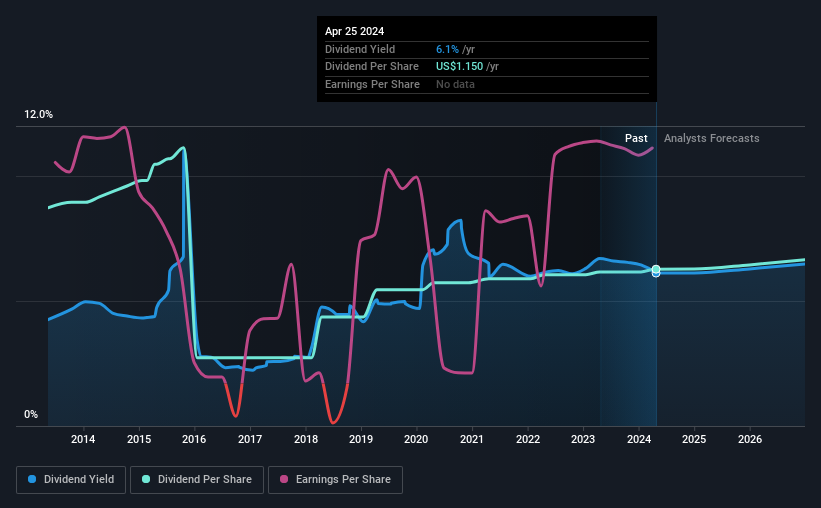Kinder Morgan (NYSE:KMI) Will Pay A Larger Dividend Than Last Year At $0.2875
Kinder Morgan, Inc. (NYSE:KMI) will increase its dividend from last year's comparable payment on the 15th of May to $0.2875. This makes the dividend yield 6.1%, which is above the industry average.
View our latest analysis for Kinder Morgan
Kinder Morgan's Earnings Easily Cover The Distributions
A big dividend yield for a few years doesn't mean much if it can't be sustained. Prior to this announcement, the company was paying out 103% of what it was earning. It will be difficult to sustain this level of payout so we wouldn't be confident about this continuing.
Over the next year, EPS is forecast to expand by 20.2%. Assuming the dividend continues along recent trends, our estimates say the payout ratio could reach 82% - on the higher side, but we wouldn't necessarily say this is unsustainable.
Dividend Volatility
The company has a long dividend track record, but it doesn't look great with cuts in the past. The dividend has gone from an annual total of $1.60 in 2014 to the most recent total annual payment of $1.15. This works out to be a decline of approximately 3.2% per year over that time. A company that decreases its dividend over time generally isn't what we are looking for.
There Isn't Much Room To Grow The Dividend
Growing earnings per share could be a mitigating factor when considering the past fluctuations in the dividend. Kinder Morgan has impressed us by growing EPS at 9.7% per year over the past five years. While EPS is growing at a decent rate, but future growth could be limited by the amount of earnings being paid out to shareholders.
Kinder Morgan's Dividend Doesn't Look Sustainable
In summary, while it's always good to see the dividend being raised, we don't think Kinder Morgan's payments are rock solid. While we generally think the level of distributions are a bit high, we wouldn't rule it out as becoming a good dividend payer in the future as its earnings are growing healthily. We don't think Kinder Morgan is a great stock to add to your portfolio if income is your focus.
Market movements attest to how highly valued a consistent dividend policy is compared to one which is more unpredictable. At the same time, there are other factors our readers should be conscious of before pouring capital into a stock. Just as an example, we've come across 3 warning signs for Kinder Morgan you should be aware of, and 2 of them are potentially serious. Looking for more high-yielding dividend ideas? Try our collection of strong dividend payers.
Have feedback on this article? Concerned about the content? Get in touch with us directly. Alternatively, email editorial-team (at) simplywallst.com.
This article by Simply Wall St is general in nature. We provide commentary based on historical data and analyst forecasts only using an unbiased methodology and our articles are not intended to be financial advice. It does not constitute a recommendation to buy or sell any stock, and does not take account of your objectives, or your financial situation. We aim to bring you long-term focused analysis driven by fundamental data. Note that our analysis may not factor in the latest price-sensitive company announcements or qualitative material. Simply Wall St has no position in any stocks mentioned.

 Yahoo Finance
Yahoo Finance 
